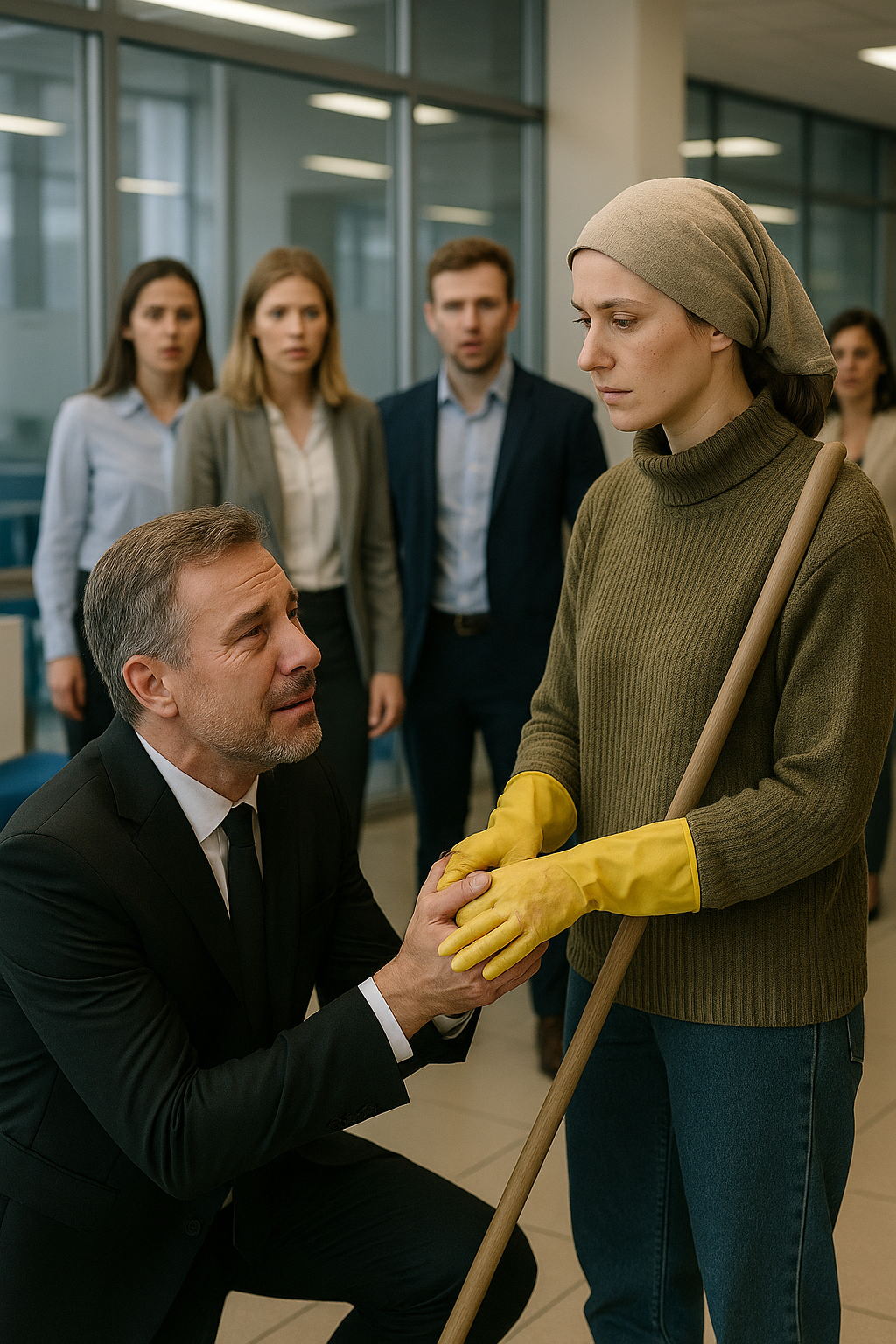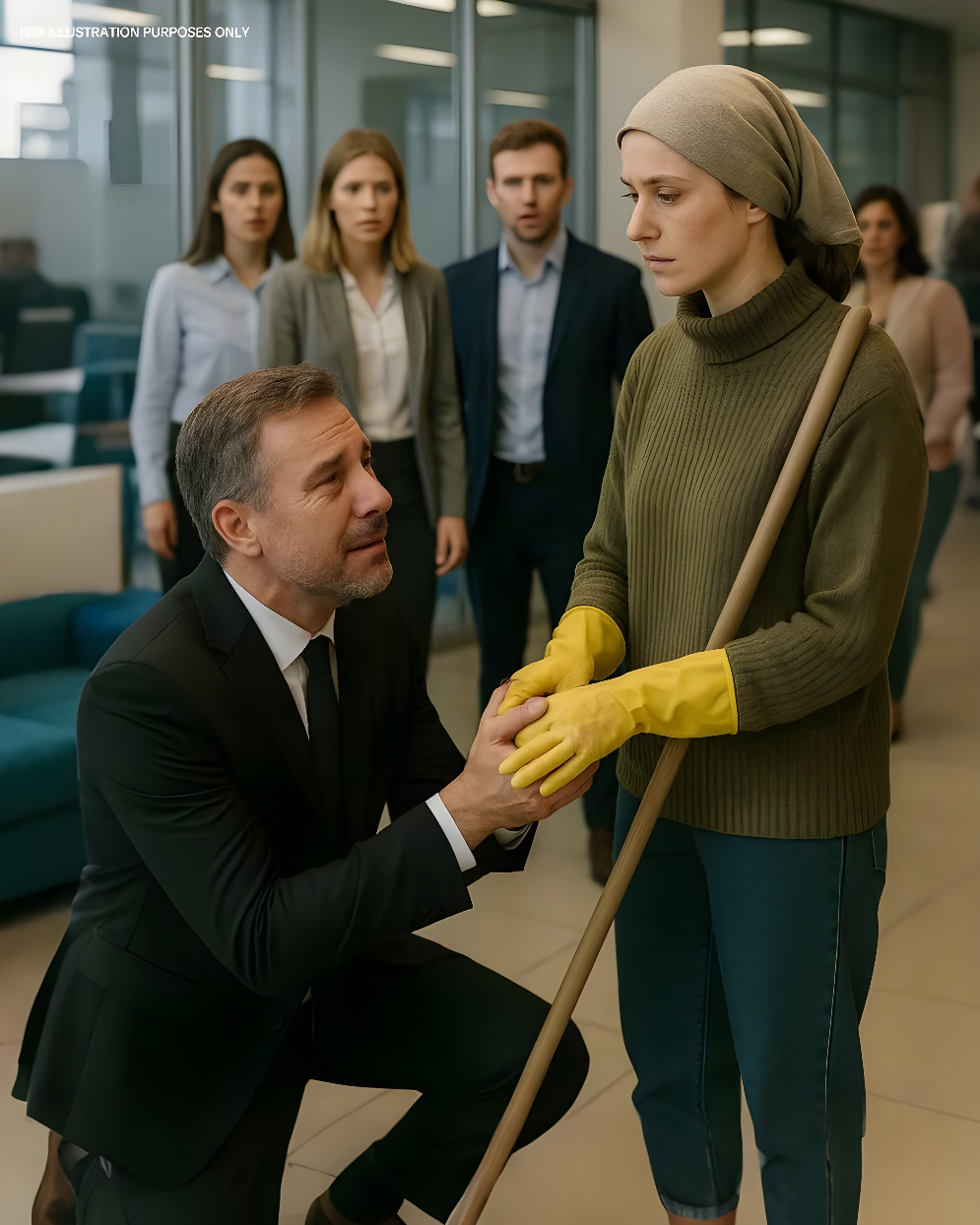For three whole months, nobody at the bank acknowledged her existence. She avoided small talk, never complained, and refrained from seeking assistance. She was simply present—
a quiet silhouette clad in a turtleneck and headscarf who moved softly through the bank’s marble corridors, tidying up the day’s aftermath without drawing attention. She meticulously polished the floors to a mirror shine, removed every fingerprint from the metal fixtures, and left behind a subtle aroma of lemon cleaner mixed with fresh air. After her work, the bank shimmered — not with sterile coldness, but with inviting warmth. It was as though someone genuinely cared.
Most workers deliberately overlooked her. A few treated her with casual cruelty.
“Hey, mute!” a young loan officer sneered once, gesturing exaggeratedly towards a spotless corner. “Missed a spot.”
She answered only with a gentle sigh, picked up her cloth, and quietly resumed cleaning. No words were spoken, no response given.
Behind her back, some whispered: “It’s eerie how she never talks.” “Maybe she’s not all there.”
Yet, she persevered—silently, diligently.
Her name was Aleptina, at least according to payroll records; few actually used it.
No one inquired about her origins or past story, and she never volunteered such information.
Unbeknownst to them, she once possessed a melodious voice and a life brimming with potential.
Years earlier, she was known as Alia — a bright, young teacher passionate about children and painting. Her life was modest but fulfilled until one tragic night changed everything.
It was a warm, languid June evening. Alia had just completed a watercolor painting of a lilac bush when a pungent smell of smoke invaded her apartment. At first, she assumed a neighbor was cooking. Then panicked screams shattered the calm.
Frightened voices echoed through the stairwell and the air grew thick not only with smoke but with terror. A blaze had erupted in the apartment opposite hers — home to a little boy named Lesha and his family.
Without hesitating, Alia grabbed her father’s toolbox and forced the door open. Flames curled along the walls; the thick, choking smoke assaulted her lungs. Inside, she discovered Lesha and his mother unconscious. Coughing and blinded, she lifted the boy and carried him toward the window, as fire barricaded the way to the hallway.
Below, firefighters shouted encouragement while holding a rescue net.
Trembling, she passed Lesha through the window to safety. Overwhelmed by heat, she collapsed but was rescued just in time.
Lesha survived; his mother did not. His father disappeared soon thereafter.

Months of hospitalization followed for Alia. Her back, arms, and shoulders bore red, angry scars from the fire. Though the physical pain was intense, the ensuing silence was even harder to bear.
Her mother passed away shortly after the fire, the shock and heartbreak too much for her frail heart. Alia ceased speaking altogether. Doctors diagnosed her silence as psychological trauma.
She relinquished her teaching role. Her universe shrank to a quiet apartment, a fish tank, and her art. Night after night, she painted — sometimes delicate watercolors, other times thick oil strokes. Her emotions poured onto canvases, though her voice remained silent.
Eventually, concerned, her father suggested selling their apartment to relocate somewhere more affordable. Alia silently agreed.
She soon found work as a cleaner. Despite lingering pain from her burns, she endured. In her silent routines, she discovered a peculiar peace — cleaners were not expected to speak.
Her career began at a small office. The manager there noticed her attention to detail and gentle manner. When that workplace moved, the manager recommended her to a contact at a nearby bank.
Thus, Aleptina arrived — a voiceless woman carrying untold stories in her heart.
Three months passed.
Then, one morning, the atmosphere shifted.
A ripple of whispers flowed through the bank as a sleek black luxury car pulled up. Out stepped a man in a tailored suit and dark glasses — Sergei Mikhailovich, the regional director.
He entered confident, accustomed to commanding attention. Staff hurried to straighten clothes and fix hairstyles.
Aleptina didn’t glance up. She was polishing the brass door handles, her yellow gloves shimmering beneath the fluorescent lights.
Yet Sergei’s eyes locked onto her. He halted abruptly; a shift flickered across his face. His pace slowed.
Unexpectedly, he approached her, knelt down, and gently removed her gloves. An eerie hush blanketed the room.
Then, to everyone’s astonishment, he kissed her scarred hands.
Tears welled in his eyes.
“Alia,” he murmured, “I have searched for you all these years…”

Stunned, the onlookers stared — a silent cleaner and the bank’s director?
But for Sergei, nothing else mattered.
“You saved my son,” he said, voice thick with emotion. “You gave him a second chance at life. You saved me too.”
Pieces fell into place.
- Lesha — the boy carried from the flames by an unknown woman.
- Sergei, a father devastated by tragedy, lost in grief and guilt.
- The woman with scars and silence — the hero whose name never reached the public.
Sergei had spent years seeking her without success. Her name did not feature in news reports. She was just “the young woman” hospitalized and then gone.
And now, here she was — scarred, voiceless, quietly enduring the pain.
“I owe you everything,” he said softly. “Please come with me.”
Aleptina—Alia—looked at him in shock. Her lips quivered.
For the first time in years, she spoke a single word.
“Lesha?”
Sergei nodded, tears streaming down his face. “He’s studying medicine now — just like you once dreamed. He wants to help others, just as you helped him.”
Alia’s lips parted, breaking the silence that had imprisoned her.
In the weeks that followed, everything transformed.
Sergei arranged for Alia to receive both physical and psychological care. Leading surgeons volunteered to treat her at no cost. A counselor supported her gently, helping restore her confidence and speech.
Stories of her bravery spread throughout the bank. Those who once mocked her now regarded her with reverence.
Yet, Alia sought no accolades.
Instead, she requested one simple thing: “Let me paint.”
Supported by Sergei, she held her initial art exhibition. Her soft watercolor paintings, filled with light and emotion, moved viewers to tears. Every piece narrated unspoken stories.
She never resumed cleaning floors — not from pride, but because she finally embraced her true self.
She kept wearing her headscarf, not as a shield but as a tribute to her past. She began to speak again, not often, but with intention and meaning.

At one gallery opening, a young man stepped forward shyly.
“Hello,” he said softly. “I’m Lesha.”
Alia smiled, tears welling once more.
She reached out and, for the first time in nearly ten years, held the hand she had once saved from fire.
Key Insight: In a world quick to judge by appearance, Alia stands as a reminder: silence doesn’t signify brokenness, scars don’t reveal weakness, and true heroes might not wear capes but simply act with a brush, a mop, and a heart full of love.
Her story is a powerful testament to the enduring strength of the human spirit and the profound impact of kindness, often hidden in the quietest corners.
In sum, Alia’s journey from silence and suffering to voice and healing exemplifies how resilience and compassion can transform lives. Her experience encourages us to look beyond surface judgments and honor the courage found in everyday heroes.
